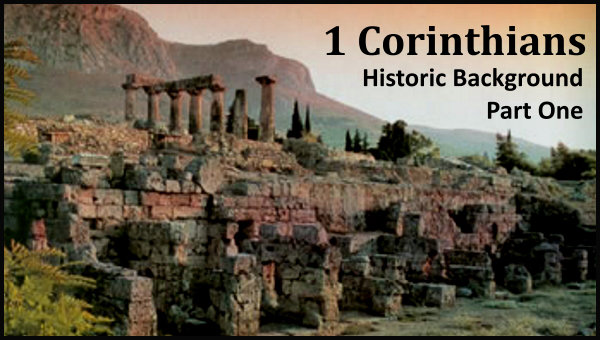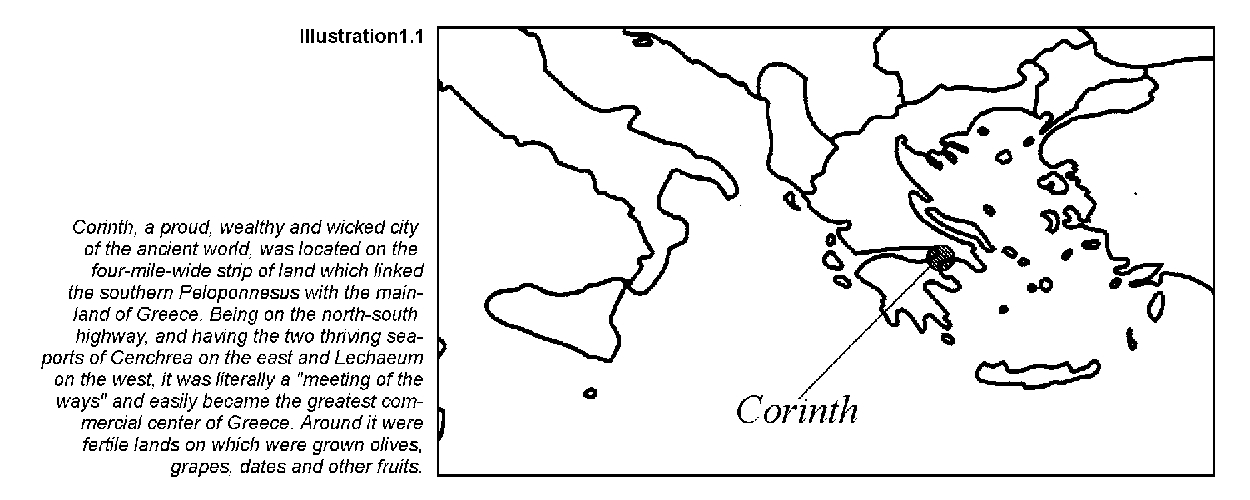By Tyson Thorne

Sanctuary in Corinth, Acts 18.1-.17
During his second missionary journey, while on the run from murderous Jews, Paul found sanctuary in Corinth (about CE 51). Corinth was an unlikely rest stop for many reasons. First, being strategically located at a narrow channel of land between the Mediterranean and the Ionian Sea (see illustration 1), it controlled the province of Achaia. As such an important crossroads of the Roman Empire, it was one of the largest cities of its day – second only to Rome – with a population of 100,000 (80,000 in the city proper, and 20,000 in the immediate suburbs).
“The city was a sprawling, open air market filled with slaves, Orientals, Jews, Greeks, Egyptians, sailors, athletes, gamblers and charioteers.”[1] Though housing the temples of Apollo, Aphrodite, Asclepius, Isis and Poseidon, the true god of Corinth was money. Prostitution was a chief occupation, the temple of Aphrodite employing, according to Strabo (an ancient Greek geographer), 1,000 prostitutes. This lead to the coining of two ancient Greek phrases, “Corinthian girl,” (originated by Plato) meaning a woman of loose morals, and “to Corinthianize,” meaning to live shamelessly and without moral restraint. Playwrights of the day portrayed citizens of Corinth as drunken brawlers. Another historian of antiquity, Apuleius, described a beautiful ballet he attended at Corinth: “Venus appeared all naked, save that her fine and comely middle was lightly covered with a thin silken smock; and this the wanton wind blew hither and thither.”[2] Even today statues of Aphrodite performing this balleta are sold in a modern pottery and statuary shop outside the ruins of Corinth.

Historically, Corinth had a proud heritage. Though its blatant evil had always been open and well known, it had been a prominent Greek city even 2,000 years before Christ. When Rome had ascended to power, the Corinthians supported Rome’s enemies in a coup attempt. Though noble in its own way, Rome proved too powerful and defeated its enemies by putting all the men to the sword in 146 BCE. Corinth lay ruined for nearly two centuries, until Julius Caesar rebuilt the city in 44 CE. This new city, the one Paul knew, was a grand accomplishment or marble streets and pillars, including a system of rollers used to push ships out of the water, across the narrow stretch of land to be dropped into the sea on the opposite side. This system saved sailors days of travel around a treacherous coastline. It would not be until the 1800’s that a better system – an actual canal – would be built. The city quickly become a cosmopolitan center of culture and hosted the second greatest sports competition of its day, the Isthmian games (only the Olympics were greater).
___________________
[1]The Last Place to Start a Church, The New Student Bible, Philip Yancey & Tim Stafford © 1992 Zondervan.
[2]Apuleius, Book X
|
|
